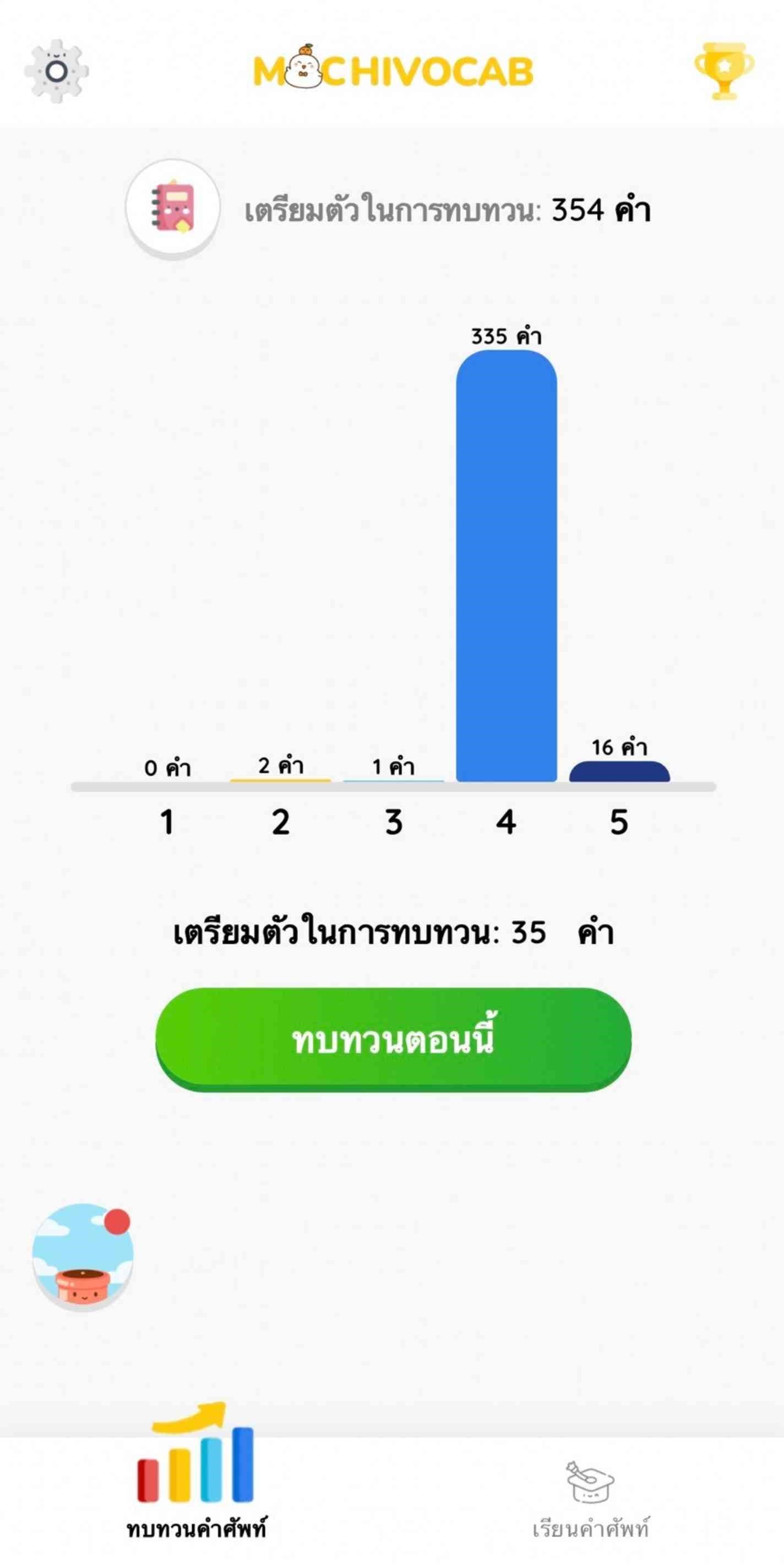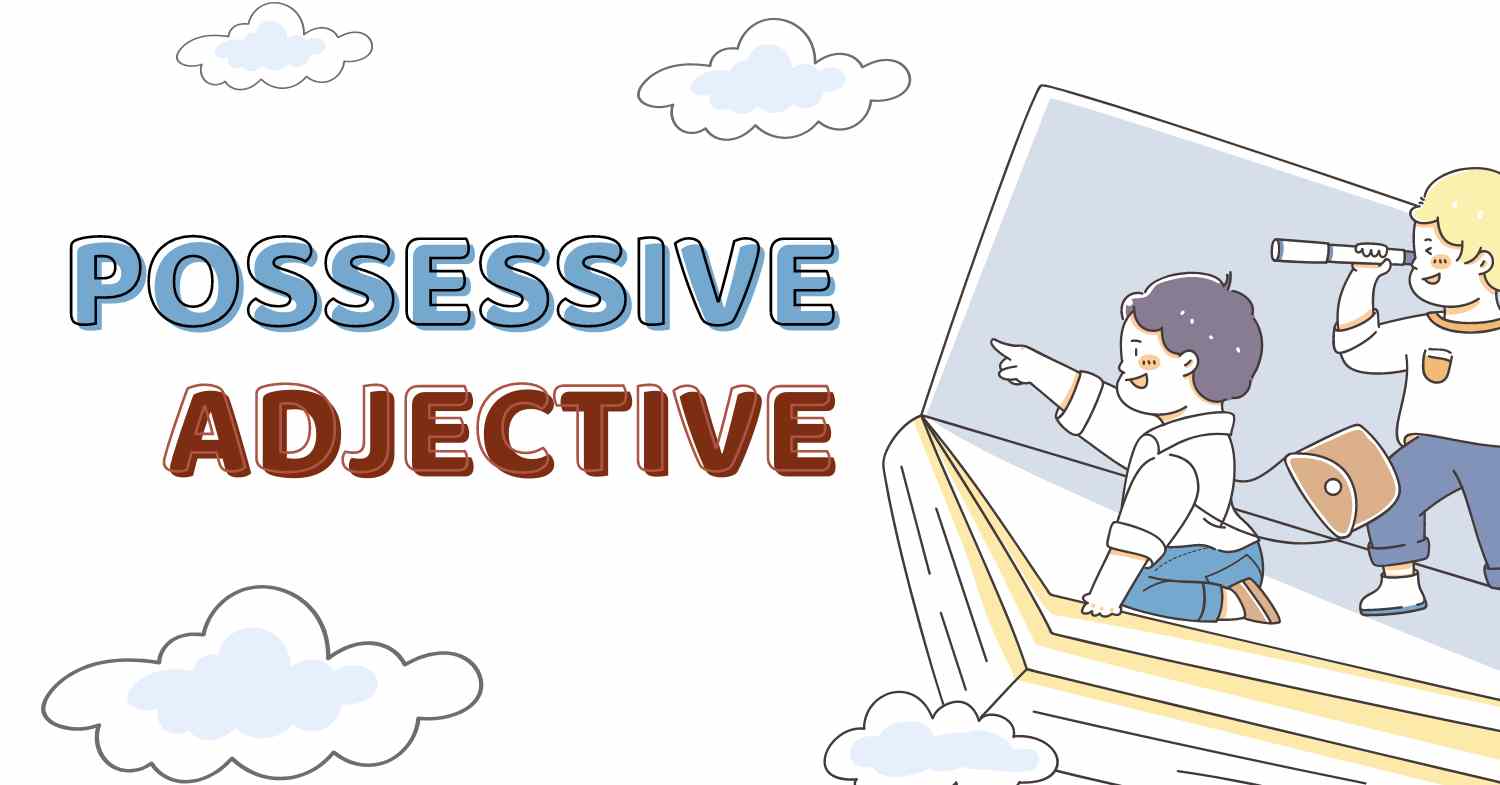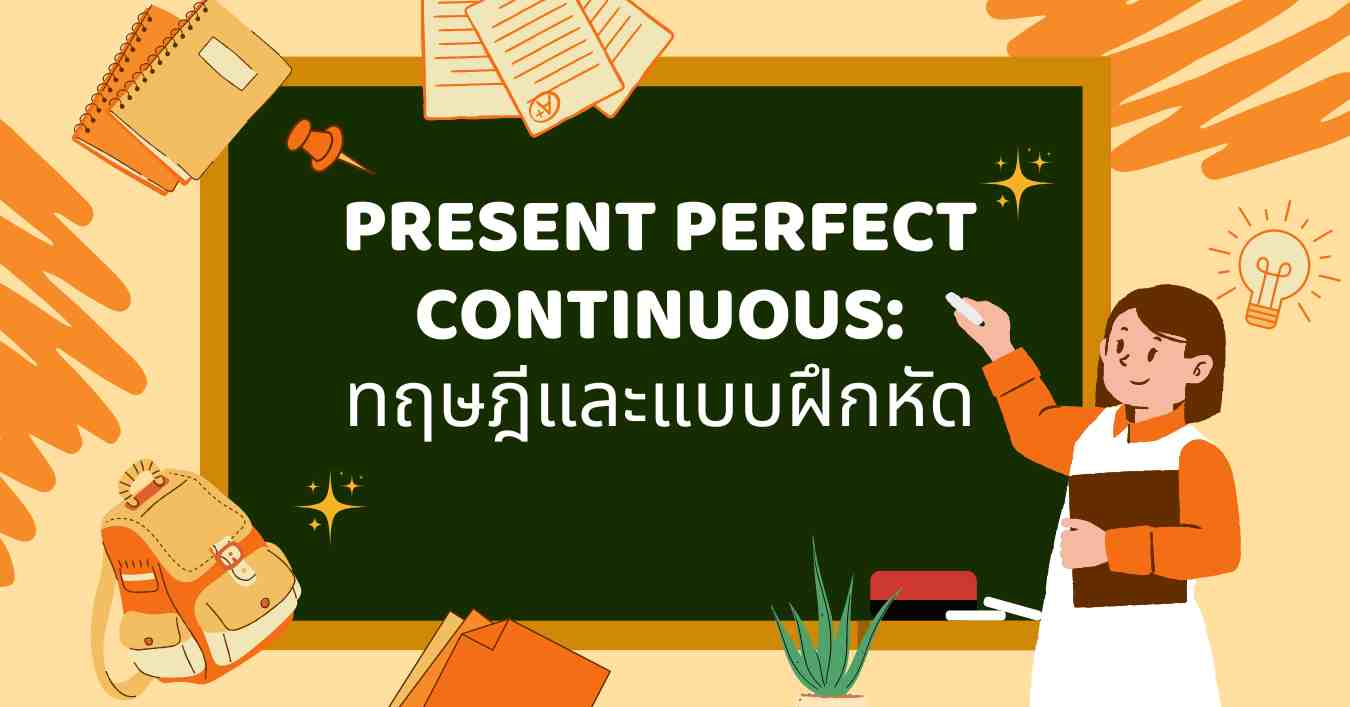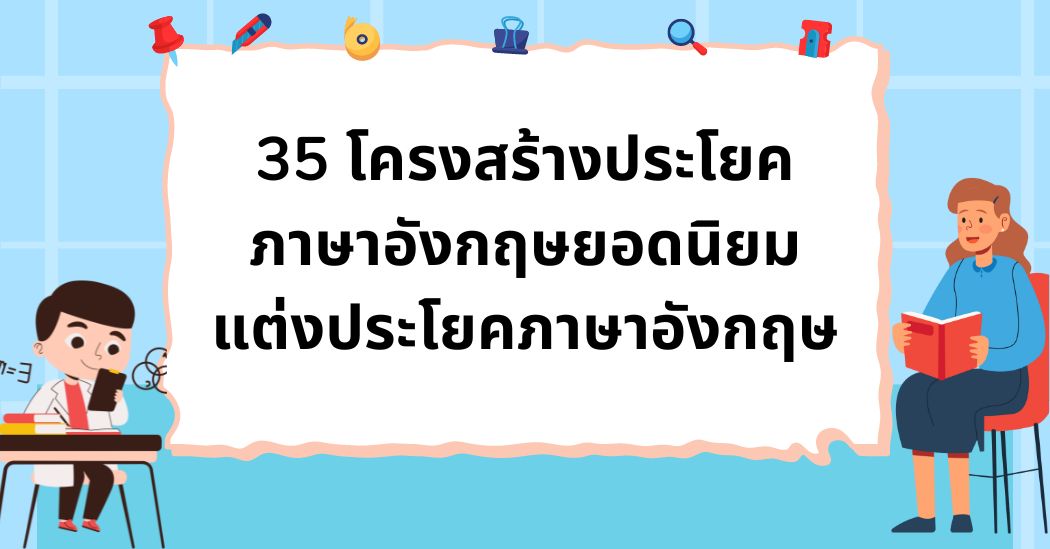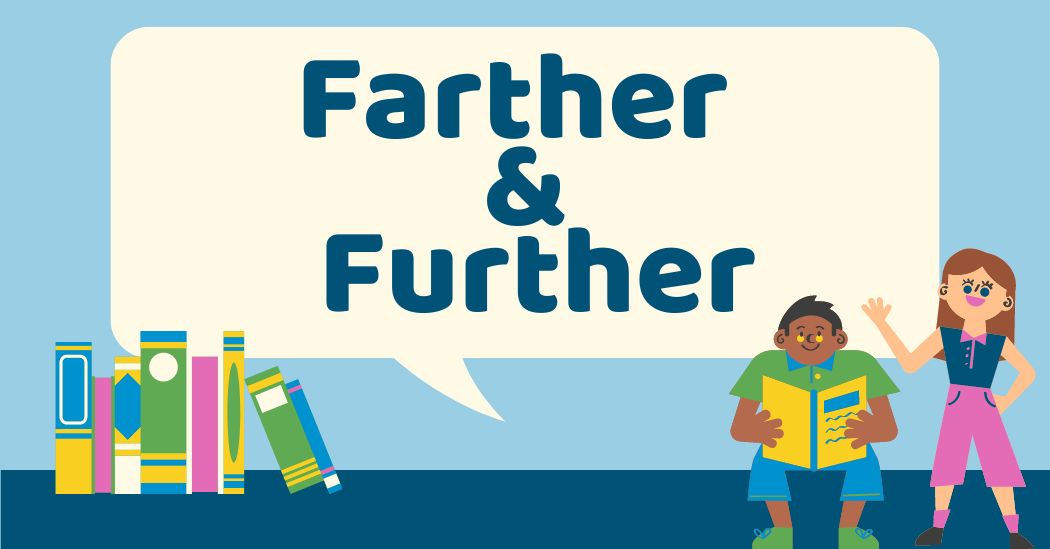Past perfect continuous tense เป็นโครงสร้างที่ซับซ้อนในภาษาอังกฤษ แต่คุณสามารถใช้ได้อย่างคล่องแคล่วหากเรียนรู้ทฤษฎีเกี่ยวกับประเด็นนี้อย่างละเอียด
เนื้อหาในบทเรียน:
- แบบฝึกหัดการใช้
- แนวคิดเกี่ยวกับ Past perfect continuous tense
- สูตรของ Past perfect continuous tense
- การใช้ Past Perfect Continuous Tense
- สัญญาณการใช้งาน Past Perfect Continuous Tense
- การแยกแยะระหว่าง Past Perfect Continuous และ Past Perfect
- เรียนรู้คำศัพท์ภาษาอังกฤษอย่างมีประสิทธิภาพกับ MochiVocab
แบบฝึกหัดการใช้
คุณพร้อมที่จะท้าทายตัวเองด้วย Past Perfect Continuous หรือยัง? ลองทำแบบทดสอบ 10 ข้อนี้ เพื่อทดสอบความรู้และพัฒนาทักษะการใช้กาลนี้!
ไม่ต้องกังวลหากคุณเจอคำศัพท์ใหม่ มองว่านี่เป็นโอกาสอันดีที่จะขยายคลังคำศัพท์ของคุณให้มากขึ้นด้วย MochiVocab “ช่วงเวลาทอง” จะเป็นตัวช่วยชั้นยอด ที่จะช่วยให้คุณจดจำคำศัพท์ใหม่ได้อย่างมีประสิทธิภาพและยาวนานยิ่งขึ้น!

แนวคิดเกี่ยวกับ Past perfect continuous tense
Past perfect continuous tense ใช้เพื่อบรรยายการกระทำหรือเหตุการณ์ที่กำลังเกิดขึ้นในอดีตและสิ้นสุดก่อนเหตุการณ์อื่นที่เกิดขึ้นในอดีต
ตัวอย่าง: She was tired because she had been working very hard (เธอเหนื่อยเพราะเธอทำงานหนักมาก)
สูตรของ Past perfect continuous tense
ประโยคบอกเล่า
โครงสร้าง:
S + had + been + V-ing
ตัวอย่าง:
She had been doing housework for ten minutes before her mother came home. (เธอทำงานบ้านเป็นเวลา 10 นาทีก่อนที่แม่ของเธอจะกลับบ้าน)
They had been playing chess before the quarrel. (พวกเขาเล่นหมากรุกก่อนการทะเลาะวิวาท)
ประโยคปฏิเสธ
โครงสร้าง:
S + had + not + been + V-ing
ตัวอย่าง:
She hadn’t been playing sports for 2 months due to a leg injury. (เธอไม่ได้เล่นกีฬาเป็นเวลา 2 เดือนเนื่องจากบาดเจ็บที่ขา)
He hadn’t been doing his homework when his parents came home. (เขาไม่ได้ทำการบ้านเมื่อพ่อแม่กลับบ้าน)
หมายเหตุ: เพียงเพิ่ม “not” หลังคำกริยาช่วย “had” และสามารถเขียน “had not” เป็น “hadn’t”
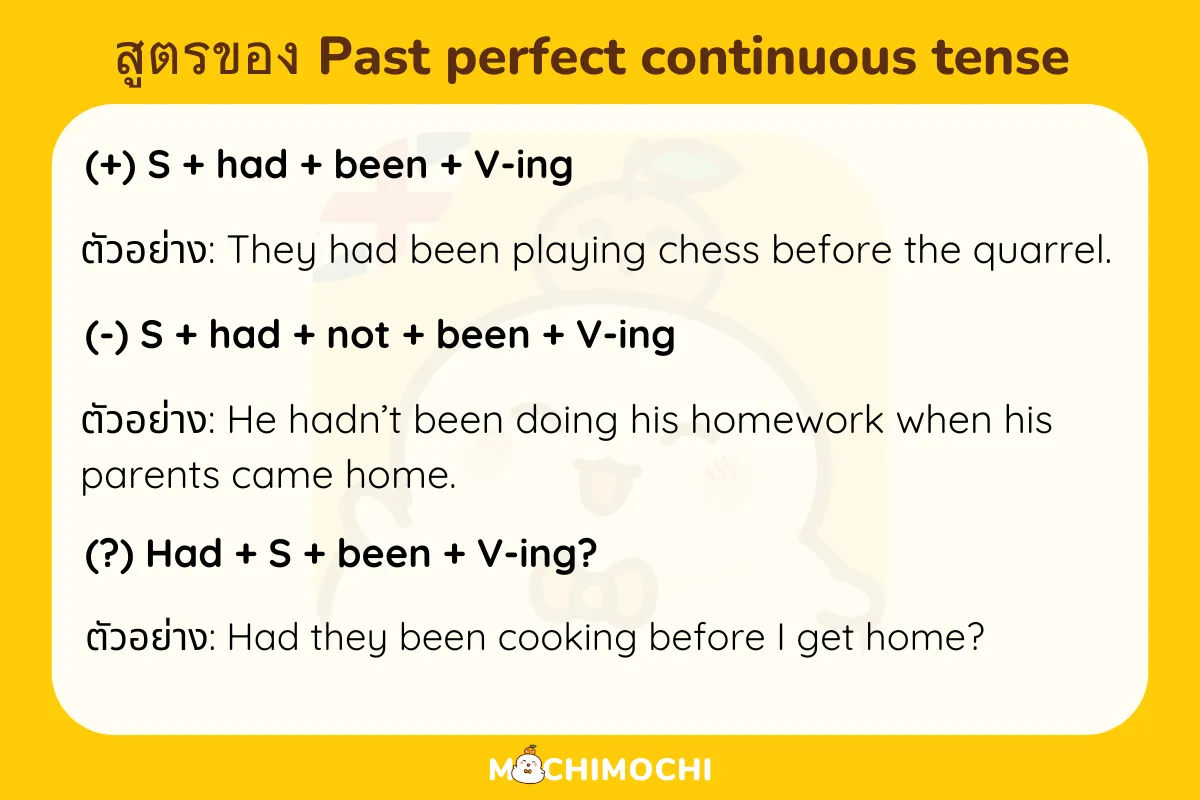
ประโยคคำถาม
ประโยคคำถามที่ใช้คำกริยาช่วย (คำถาม Yes/No)
โครงสร้าง:
Had + S + been + V-ing?
ตอบ:
Yes, S + had.
No, S + hadn’t.
ตัวอย่าง:
Had they been cooking before I get home? (พวกเขาทำอาหารก่อนฉันกลับบ้านไหม?)
Had you been waiting for her for 2 hours when the match ended? (คุณรอเธอถึง 2 ชั่วโมงเมื่อการแข่งขันจบลงใช่ไหม?)
ประโยคคำถามที่ใช้คำถาม Wh-
โครงสร้าง:
Wh- + had + S + been + V-ing?
ตัวอย่าง:
How long had you been waiting? (คุณรอนานแค่ไหนแล้ว?)
What had you been doing for 1 hour before you went to sleep last night? (คุณทำอะไรเป็นเวลา 1 ชั่วโมงก่อนเข้านอนเมื่อคืนนี้?)
การใช้ Past Perfect Continuous Tense
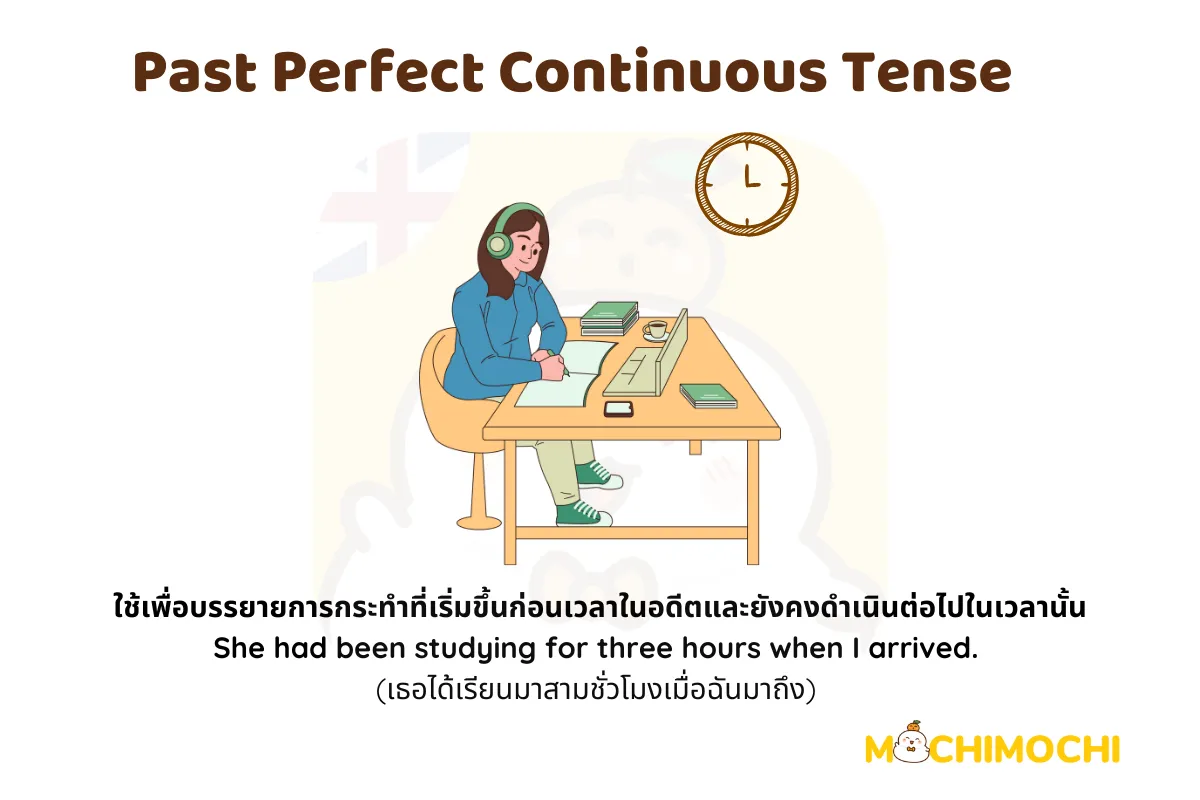
- ใช้เพื่อบรรยายการกระทำที่เริ่มขึ้นก่อนเวลาในอดีตและยังคงดำเนินต่อไปในเวลานั้น
ตัวอย่าง: She had been studying for three hours when I arrived. (เธอได้เรียนมาสามชั่วโมงเมื่อฉันมาถึง)
- ใช้เพื่อบรรยายการกระทำที่เริ่มขึ้นก่อนเวลาในอดีตและสิ้นสุดลงทันทีที่เวลานั้น
ตัวอย่าง: They were tired because they had been running. (พวกเขาเหนื่อยเพราะพวกเขาวิ่ง.)
- ใช้เพื่อบรรยายสาเหตุของเหตุการณ์ในอดีต
ตัวอย่าง: He had been working hard, so he needed a rest. (เขาทำงานหนัก ดังนั้นเขาต้องการพักผ่อน.)
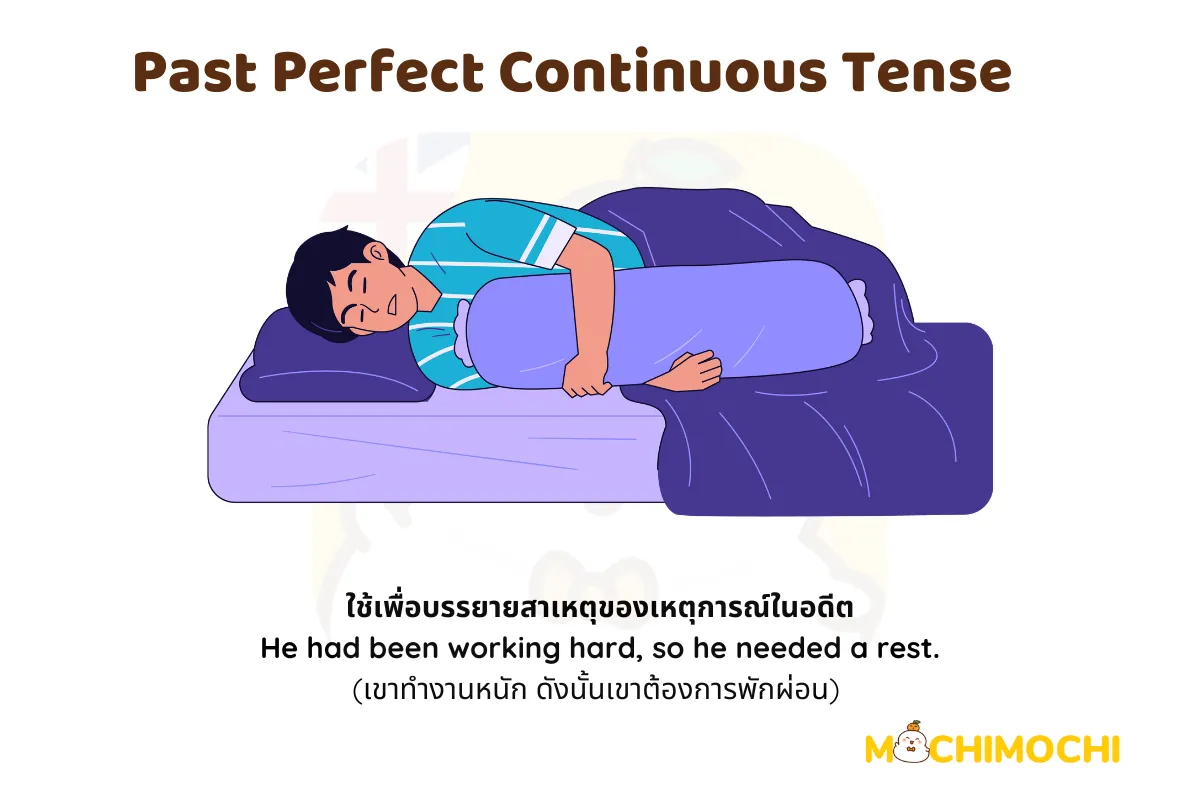
- ใช้เพื่อบรรยายการกระทำที่ดำเนินต่อเนื่องหรือทำซ้ำจนถึงเวลาหนึ่งในอดีต
ตัวอย่าง: We had been trying to contact her all morning. (พวกเราพยายามติดต่อเธอตลอดทั้งเช้า.)
หมายเหตุ:
ในประโยคเงื่อนไขแบบที่ 3 (Third Conditional), Past Perfect Continuous มักใช้เพื่อเน้นถึงช่วงเวลาแห่งการกระทำที่ยังไม่เกิดขึ้นในอดีต หรือเกิดขึ้นแล้วแต่ไม่บรรลุผลตามที่คาดหวัง ประโยคเงื่อนไขแบบที่ 3 บรรยายถึงสภาวะที่ไม่เป็นจริงในอดีตและผลที่ตามมา
ตัวอย่าง: If she had been studying harder, she would have passed the exam. (ถ้าเรียนหนักกว่านี้เธอคงสอบผ่านแน่นอน)
สัญญาณการใช้งาน Past Perfect Continuous Tense
คุณสามารถดูสัญญาณต่อไปนี้เพื่อระบุ Past Perfect Continuous Tense ได้
| Signs (สัญญาณบ่งบอก) | Examples (ตัวอย่าง) |
|---|---|
| Until then (จนกว่าจะถึงตอนนั้น) | Until then, she had been sleeping. จนกว่าจะถึงตอนนั้น เธอกำลังนอนหลับอยู่ |
| By the time (ก่อนเวลา) | By the time we arrived at the station, the train had been waiting for 15 minutes. เมื่อเรามาถึงสถานี รถไฟก็รอมา 15 นาทีแล้ว |
| By, before + mốc thời gian (ก่อนเวลา + เวลาหรือเหตุการณ์) | They had been playing football for two hours before it started to rain. พวกเขาเล่นฟุตบอลมาสองชั่วโมงก่อนที่ฝนจะเริ่มตก |
| Prior to that time (ก่อนหน้านั้น) | They had been living in the countryside for five years prior to that time. พวกเขาอาศัยอยู่ในชนบทมาแล้วห้าปีก่อนเวลานั้น |
การแยกแยะระหว่าง Past Perfect Continuous และ Past Perfect
โครงสร้าง
| Past Perfect | Past Perfect Continuous |
|---|---|
| 1. Tobe:S + had been+ Adj/nounตัวอย่าง: She had been a good dancer when she met a car accident 2. Verb:S + had + V3 (past participle)ตัวอย่าง: We went to his office, but he had left | S + had been Vingตัวอย่าง: She had been carrying a heavy bags |
หน้าที่ & วิธีการใช้
| 1. แสดงถึงการกระทำที่เกิดขึ้นก่อนการกระทำอื่นในอดีต ตัวอย่าง: By the time he arrived, the train had already left. | 1. แสดงถึงการกระทำที่เกิดขึ้นก่อนการกระทำอื่นในอดีต (เน้นการต่อเนื่อง) ตัวอย่าง: I had been thinking about that before you mentioned it |
| 2. ใช้เพื่ออธิบายการกระทำก่อนเวลาที่กำหนดในอดีตตัวอย่าง: I had finished my homework before 10 o’clock last night. 3. ใช้ในสูตรบางประการดังต่อไปนี้: ประโยคเงื่อนไขประเภทที่ 3 If I had known that, I would have acted differently. ประโยค Wish แสดงถึงความปรารถนาที่ตรงข้ามกับอดีต:I wish you had told me about that | 2. แสดงถึงการกระทำที่ดำเนินต่อเนื่องไปจนถึงการกระทำอื่นในอดีต ตัวอย่าง: We had been making chicken soup, so the kitchen was still hot and steamy when she came in |
เรียนรู้คำศัพท์ภาษาอังกฤษอย่างมีประสิทธิภาพกับ MochiVocab
MochiVocab เป็นแอปพลิเคชันการเรียนรู้คำศัพท์ภาษาอังกฤษที่ใช้วิธีการ Spaced Repetition ในการวิเคราะห์ประวัติการเรียนรู้ของผู้ใช้เพื่อคำนวณ “ช่วงเวลาทอง” ซึ่งจะแจ้งเตือนผู้ใช้ให้ทบทวนเมื่อสมองกำลังจะลืมความรู้ด้วยการเรียนเพียงวันละ 10-15 นาที MochiVocab ช่วยให้ผู้เรียนจำคำศัพท์ได้ถึง1000 คำ
คุณสมบัติที่โดดเด่นที่สุดคือ “ช่วงเวลาทอง” ซึ่งจะที่คำนวณเวลาที่ผู้ใช้ลืมคำศัพท์ตามประวัติการเรียนรู้ของผู้ใช้ เมื่อถึงเวลานั้น แอปพลิเคชันจะแจ้งเตือนโทรศัพท์ให้ผู้ใช้เพื่อทบทวนและเพิ่มประสิทธิภาพในการจำ
จากผลการเรียนของคุณ MochiVocab จะจัดเรียงคำศัพท์ที่คุณได้เรียนรู้ตามระดับความจำ 5 ระดับ คำศัพท์ในระดับที่สูงขึ้นจะมีช่วงเวลาทบทวนที่ยาวนานขึ้น ในทางกลับกัน คำศัพท์ในระดับต่ำจะถูกแจ้งเตือนให้ทบทวนบ่อยขึ้นจนกว่าคุณจะจำได้อย่างแม่นยำ วิธีนี้ช่วยให้คุณลดเวลาทบทวนคำศัพท์ที่จำได้แล้วเพื่อมุ่งความสนใจไปที่คำที่ยากกว่าและคำที่คุณมักจะลืม
กับ MochiVocab การเรียนรู้คำศัพท์จะไม่ใช่ปัญหาในการเรียนภาษาอังกฤษของคุณอีกต่อไป เริ่มต้นประสบการณ์เพื่อปรับปรุงระดับของคุณกันเถอะ



